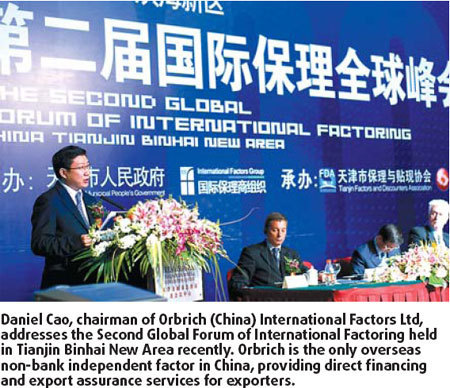

Though top policy makers have defined Tianjin as a future, if not current, "global harbor city", it's not an easy honor to live up to because it requires the costal municipality to expand its international trade sector.
The bulk of the city's exporters are small and medium enterprises (SMEs) suffering from a lack direct financing and bad or uncertain accounts receivable. Factoring, a common international financing and trade tool, could help them, says Daniel Cao, chairman of the Tianjin-based Orbrich (China) International Factors Ltd.
Factoring is the business of purchasing and collecting accounts receivable or of advancing cash on the basis of accounts receivable.

Banks that offer the service can perform it, as can financial service firms that specialize in factoring. Developing factoring has been listed as a priority on Tianjin's financial reform and innovation agenda, Cao says.
"Factoring has been defined as one of Tianjin's top 20 financial innovation and development programs," Cao says. Orbrich is the only non-bank independent factoring service in China. It provides financing and export assurance services for exporters, most of them SMEs.
The factoring business is small in China, compared with the country's robust international trade, says Cao.
But the factoring sector has large growth potential in China, as exporters outnumber importers and the latter currently have an upper leg over exporters in today's international trade, in terms of payment.
"Compared with other financial means, factoring is more suitable for providing short-term financing services and account receivable assurances for SMEs. Nowadays the service is not enough for SMEs. This is not in line with Tianjin and China's current trade situation," Cao says.
Recent statistics from the Ministry of Commerce say that nearly 70 percent of China's current foreign trade stems from SMEs.
In Tianjin, 20,000 enterprises have licenses to conduct foreign trade and most of them are SMEs, Zhang Pei, an official with the Tianjin commission of commerce (TCC), says.
Last year, the city witnessed $71.55 billion in foreign trade, among which 38.12 billion was for exports.
"SMEs are playing increasingly important roles in driving up Tianjin's foreign trade and exports," Zhang emphasizes.
SMEs account for 99.9 percent of Tianjin's total enterprises. They contribute to more than 60 percent of the city's tax income, 70 percent of GDP and 80 percent of the employment.
Factoring would relieve SMEs of some financial burdens, Zhang stresses.
"Eventually, the factoring sector will help fuel Tianjin's foreign trade," Zhang predicts.
"In Europe, 80 percent of the non-bank factoring businesses are for SMEs which lack financial support. In China, SMEs also face the difficulties of direct financing," says Fang Shangpu, deputy administrator of the State Administration of Foreign Exchange (SAFE), who addressed an international non-bank factoring seminar in Tianjin recently.
The size of the factoring business is small in China, compared with the country's robust international trade, says Cao.
But no matter if the factor services are offered by banks or not, they face the same obstacles in China, including the lack of relevant laws and regulations, the lack of talents and enterprises' low awareness of factoring, Cao says.
While his company is introducing training programs to spread word about factoring benefits, the Orbrich boss says would like to see more laws and regulations to better govern the segment and the training of factoring professionals.
Innovation
The introduction and development of factoring in Tianjin would fuel and deepen financial reform in the Tianjin's Binhai New Area, the next growth engine of China, Fang from SAFE stresses.
"The segment, therefore, deserves encouragement for further development in Tianjin and China at large," Fang contends.
The international market value of factoring reached to 1,300 billion euros ($2.03 billion) in 2007, accounting for 3.3 percent of global GDP.
Developing factoring business has been listed as a priority on Tianjin's financial reform and innovation agenda, Cao introduces.
"Factoring has been defined as one of Tianjin's top 20 financial innovation and development programs," Cao says.
(China Daily 05/03/2008 page10)













